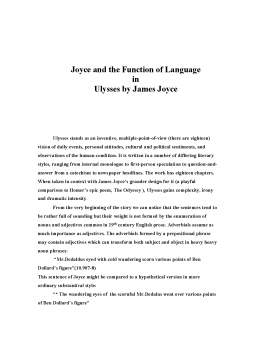Extras din referat
Ulysses stands as an inventive, multiple-point-of-view (there are eighteen) vision of daily events, personal attitudes, cultural and political sentiments, and observations of the human condition. It is written in a number of differing literary styles, ranging from internal monologue to first-person speculation to question-and-answer from a catechism to newspaper headlines. The work has eighteen chapters. When taken in context with James Joyce’s grander design for it (a playful comparison to Homer’s epic poem, The Odyssey ), Ulysses gains complexity, irony and dramatic intensity.
From the very beginning of the story we can notice that the sentences tend to be rather full of sounding but their weight is not formed by the enumeration of nouns and adjectives common in 19th century English prose. Adverbials assume as much importance as adjectives. The adverbials formed by a prepositional phrase may contain adjectives which can transform both subject and object in heavy heavy noun phrases:
“Mr.Dedaldus eyed with cold wandering scorn various points of Ben Dollard’s figure”(10.907-8)
This sentence of Joyce might be compared to a hypothetical version in more ordinary substantival style:
“* The wandering eyes of the scornful Mr.Dedalus went over various points of Ben Dollard’s figure”
Joyce’s style involves certain syntactic problems. In this case, the word order follows the normal principle of weight, the direct object coming after the shorter adverbial phrase. The sentence is removed from the domain of the familiar through the presence of two adjectives in the adverbial phrase.
Adverbials include adverbs, adverb phrases and prepositional phrases that have a boarder function in the clause. Moreover adverbials have the peculiarity of multiple occurrence in a clause:
“A young man clinging to a spur of rock near him, moved slowly frogwise his green legs in the deep jelly of the water.”(1680-81).
This sentence in “Telemachus” is a clear evidence of the abundance of adverbials. Afterwards another problems with adverbials occurs:
“An elderly man shot up near the spur of rock a blowing red face.”(1680-81)
The opening sentence of Ulysses is conceived with a prominent detached adverb: ”Stately, plump Buck Mulligan came…’’(1.1) We know that stately is an adverb as in Hamlet (A figure…goes slow and stately by them, act 1,sc 2.lines 199-202) because Joyce never separates attributes adjectives by comma.
Furthermore Joyce exploited a lot one of Flaubert’s inventions, which consists in ending the sentences with an emphatic word that normally would be possessed elsewhere. Afterwards discovered commonplace participles an equivalent for Flaubert’s final adverbs.
Joyce was familiar with the comparable phenomenon of long vowels in succession in Latin (fasces virgarum) which had considerable influence on classical metrics. The author tends to use them for heavier effects, “plump Buck Mulligan, as stolid as the big red boat”, introduces us immediately in Ulysses to three stressed syllables in a row, and elsewhere we find Joyce carefully choosing accentual patterns like “The key scraped round harshly twice” (1327) “over twice scraped round harshly” or “harshly scrapped round twice”, which might encourage us to lighten a stress here or there. Sometimes we find in which the sequence of stressed vowels emerges all the more because of sense and because the theoretically un accented syllables are either built up considerably by consonant clusters or they are so fragile that they almost vanish: “his fierce eyes scowled intelligently over all their faces” (10.1002-3).
Preview document
Conținut arhivă zip
- Joyce and the Function of Language in Ulysses by James Joyce.doc








